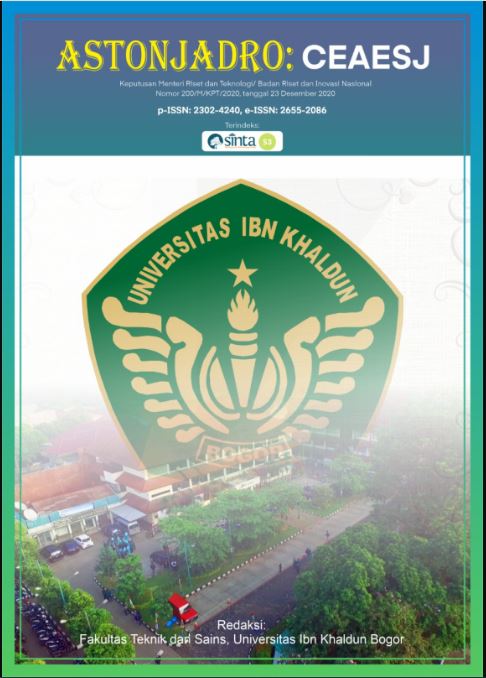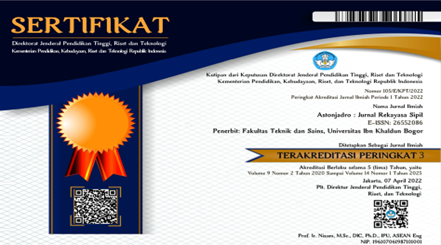IMPLICATION OF SPATIAL PATTERN OF HOUSING DISTRIBUTION TO THE EXISTENCE OF AGRICULTURAL LAND IN TABANAN URBAN AREA
DOI:
https://doi.org/10.32832/astonjadro.v11i2.6447Keywords:
urban area, housing, conversion of agricultural land, subak, culture.Abstract
The Tabanan Urban Area functions as a buffer area (counter magnet) around the Sarbagita Metropolitan core area, namely Denpasar and Kuta. Regional development is directed as a center for government services, trade and services as well as urban settlements. The Tabanan Urban Area is currently the target of expansion of urban housing development, especially those carried out by developers. Most housing developments occur on agricultural land that functions as a buffer for the Balinese 'subak' cultural order. This study aims to see the implications of the spatial pattern of housing distribution on the existence of agricultural land in the Tabanan Urban Area. This study uses a descriptive qualitative approach with a historical spatial tracking method. Periodization of housing distribution pattern is done by map overlay analysis and nearest neighbor analysis. The findings of this study indicate that the spatial distribution pattern of housing occurs randomly and spreads with a leap-frog development pattern. This form was found to be the most offensive dispersal pattern in reducing existing agricultural land. The implication of this housing distribution pattern on the rate of land conversion was found to reach 40.39 ha or about 33.25% of the Tabanan urban area. Subak, as a subsystem of Balinese cosmic spatial planning, has experienced decadence not only at the physical level, but extends to the systemic socio-religious dimension. The intrusive pattern of Balinese culture and culture occurs due to high land use discrepancies. This is especially true for the three subak subsystems, namely parhayangan-pawongan-palemahan.
References
Arimbawa, Wahyudi. (2016). Peran Desa Adat Dalam Pengendalian Pemanfaatan Lahan Di Desa Jatiluwih, Bali. Jurnal Lingkungan Binaan Ruang-Space. 3(3), 238-254. (Indonesian).
Catanese, Anthony J. & James C. Snyder. (1992). Perencanaan Kota. Jakarta: Erlangga. (Indonesian).
Clark, P.J., dan F.C. Evans. (1954). Distance to Nearest Neighbor as a Measure of Spatial Relationship in Populations. Journal of Ecology. (35), 445-453.
DR Astoeti, NKA Dwijendra. 2021. GREEN SUPPLY CHAIN PERFORMANCE BASED ON GREEN BUILDING ASSESSMENT (Case Study of Sukawati Art Market Construction Stage, Gianyar Regency). ASTONJADRO: CEAESJ 11 (1), 94-107.
D Sinabariba, S Lubis, G Giatwin. 2021. SPORTS ARENA AND ENTERTAINMENT DESIGN. ASTONJADRO: CEAESJ 10 (2), 352-372.
G Natasasmita, T Murtejo, N Chayati, M Lutfi. 2018. STUDI KELAYAKAN INVESTASI FINANSIAL (Studi Kasus: Perumahan BIA Residence). ASTONJADRO: CEAESJ 7 (1), 1-7. (Indonesian).
Haggett, Petter. (1970). Locational Analysis in Human Geography. London: Edward Arnold.
I Sabariah, S Syaiful, NI Hayati. 2012. ANALISIS METODE NETWORK PLANNING DAN S-CURVE PROYEK KONSTRUKSI DI BOGOR. ASTONJADRO: CEAESJ 1 (1), 28-34. (Indonesian).
Koestoer, Raldi Hendro. (2001). Dimensi Keruangan Kota: Teori dan Kasus. Jakarta: Penerbit Universitas Indonesia. (Indonesian).
Lockeretz, William. (1989). Problems in evaluating the economics of ecological agriculture. Agriculture. Ecosystems Environment. (27), 67-75.
M Lutfi, BN Syaifullah. 2020. ANALISIS KELAYAKAN BANGUNAN GEDUNG PASAR SUKASARI BOGOR MELALUI PENDEKATAN LAIK FUNGSI BANGUNAN. ASTONJADRO: CEAESJ 9 (1), 14-23. (Indonesian).
News Detik.com. (2019). Bali Antara New.com. 2017. REI Bidik Gianyar dan Tabanan Bangun Rumah Subsidi dalam https://bali.antaranews.com/berita/109846/rei-bidik-gianyar-dan-tabanan-bangun-rumah-subsidi. diakses Februari 2019. (Indonesian).
NPYL Vianthi, IDGAD Putra. 2022. EVALUATION OF ARCHITECTURAL COMPONENTS IN BAYUNG GEDE VILLAGE SETTLEMENT, BALI AS A TOURISM OF SPECIAL INTEREST. ASTONJADRO: CEAESJ 11 (1), 174-197.
NNS Putri, NKA Dwijendra. 2021. DOMINANT FACTORS CHANGE OF LAND FUNCTION IN RAPUAN ROAD CORRIDOR UBUD BALI DUE TO TOURISM ACTIVITIES. ASTONJADRO: CEAESJ 11 (1), 118-129.
Windia, Wayan dkk (2015). Aspek Ritual pada Sistem Irigasi Subak sebagai Warisan Budaya Dunia. Jurnal Kajian Bali. 5(1), 23-38. (Indonesian).
Yunus, Hadi Sabari. (2005). Struktur Tata Ruang Kota. Yogyakarta: Pustaka Pelajar. (Indonesian).
Downloads
Published
How to Cite
Issue
Section
License
Paper submitted to ASTONJADRO is the sole property of the Astonjadro Journal. Unless the author withdraws the paper because he does not want to be published in this journal. The publication rights are in the journal Astonjadro.ASTONJADRO
LICENSE
This work is licensed under a Creative Commons Attribution-ShareAlike 4.0 International License.
Based on a work at http://ejournal.uika-bogor.ac.id/index.php/ASTONJADRO













